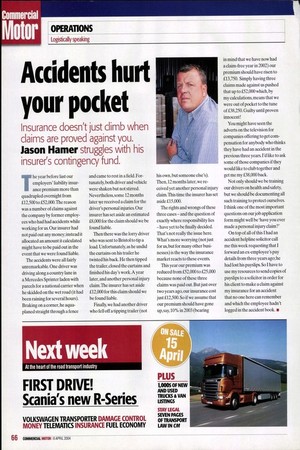Accidents hurt your pocket
Page 66

If you've noticed an error in this article please click here to report it so we can fix it.
Insurance doesn't just climb when
claims are proved against you. Jason Hamer struggles with his
insurer's contingency fund.
The year before last our employers' liability insurance premium more than quadrupled overnight from £12,500 to £52,000.The reason was a number of claims against the company by former employees who had had accidents while working for us. Our insurer had not paid out any money; instead it allocated an amount it calculated might have to be paid out in the event that we were found liable. The accidents were all fairly unremarkable. One driver was driving along a country lane in a Mercedes Sprinter laden with parcels for a national carrier when he skidded on the wet road (it had been raining for several hours). Braking on a corner, he aquaplaned straight through a fence
and came to rest in afield. Fortunately, both driver and vehicle were shaken but not stirred. Nevertheless, some 12 months later we received a claim for the driver's personal injuries. Our insurer has set aside an estimated £8,000 for the claim should we be found liable.
Then there was the lorry driver who was sent to Bristol to tip a load. Unfortunately, as he undid the curtains on his trailer he twisted his back. He then tipped the trailer, closed the curtains and finished his day's work.A year later, and another personal injury claim.The insurer has set aside £12,000 for this claim should we be found liable. Fmally, we had another driver who fell off a tipping trailer (not
his own, but someone else's). Then,12 months later, we received yet another personal injury claim.This time the insurer has set aside £15,000.
The rights and wrongs of these three cases—and the question of exactly where responsibility lies — have yet to be finally decided. That's not really the issue here. What's more worrying (not just for us, but for many other businesses) is the way the insurance market reacts to these events. This year our premium was reduced from £52,000 to £25,000 because none of these three claims was paid out. But just over two years ago, our insurance cost just £12,500. So if we assume that our premium should have gone up, say, 10% in 2003 (bearing
in mind that we have now had a claim-free year in 2002) our premium should have risen to £13,750. Simply having three claims made against us pushed that up to £52,000 which, by my calculations, means that we were out of pocket to the tune of £38,250. Guilty until proven innocent!
You might have seen the adverts on the television for companies offering to get compensation for anybody who thinks they have had an accident in the previous three years. I'd like to ask some of those companies if they would like to club together and get me my £38,000 back.
Not only should we be training our drivers on health and safety, but we should be documenting all such training to protect ourselves. I think one of the most important questions on our job application form might well be 'have you ever made a personal injury claim?' On top of all of this I had an accident helpline solicitor call me this week requesting that I forward an ex-employee's pay details from three years ago; he had lost his payslips. So I have to use my resources to send copies of payslips to a solicitor in order for his client to make a claim against my insurance for an accident that no one here can remember and which the employee hadn't logged in the accident book. •






































































































